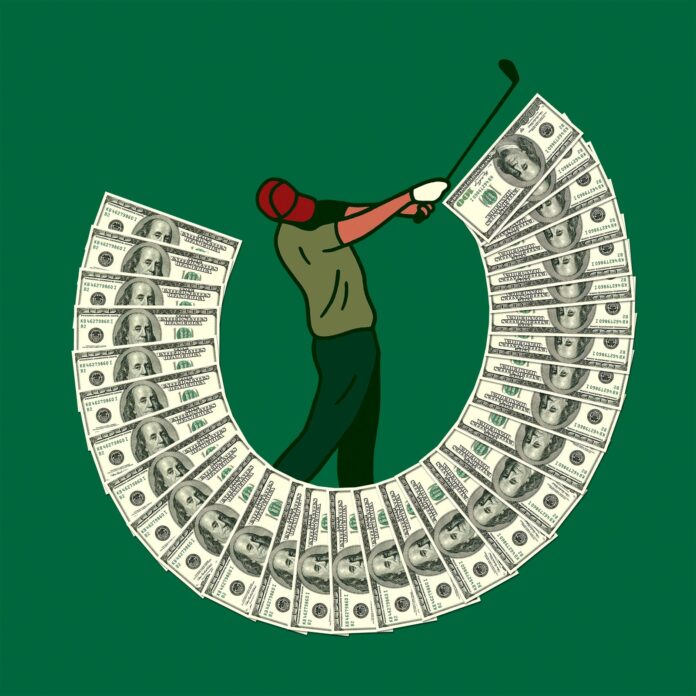Content
This content can also be viewed on the site it originates from.
When a professional golfer wants to pass along a rumor, he’ll tell you that he heard it “on the range.” The pro driving range conjures a serious place where serious men who abide by dress codes and honor systems tweak swing paths and spin rates, but this impression is incomplete. The range, the one location where everyone in the sport gathers, is also golf’s back room. Pre-round chat may concern course conditions, or who is sleeping with whose wife. Recently, the range has been preoccupied by one topic. Since late last year, representatives of Saudi Arabia’s sovereign wealth fund, the multibillion-dollar investment vehicle for the kingdom, have been quietly recruiting players for a new super-league that they hope will rival the P.G.A. Tour. They were calling it LIV; the name derives from the Roman numeral fifty-four, to denote what they consider “a perfect score in golf,” and is pronounced as in “live large.” LIV life was lucrative. The Saudis, who’d devised a twelve-team league, planned to spend two billion dollars, much of that on guarantees for players. “You’d hear numbers,” a longtime golf manager told me. “You’d hear ‘a hundred million’ a lot.” Tiger Woods was said to have declined a package valued at seven to eight hundred million dollars. One line I heard often on the range this summer was that there are only three types of pro—those who’ve taken Saudi money, those who are thinking about taking Saudi money, and those who aren’t good enough to be offered Saudi money.
Most outsiders first heard about LIV in February, from Phil Mickelson, one of the P.G.A. Tour’s biggest stars and most consistent critics. “They’re scary motherfuckers,” Mickelson said of the Saudis, in an interview with the golf writer Alan Shipnuck. He said he viewed LIV as a vehicle for Saudi “sportswashing”—a front for the crown prince, Mohammed bin Salman, known as M.B.S., to launder his reputation. He also recognized it as useful leverage. He went on, “We know they killed Khashoggi and have a horrible record on human rights. They execute people over there for being gay. Knowing all of this, why would I even consider it? Because this is a once-in-a-lifetime opportunity to reshape how the PGA Tour operates.” Shipnuck published the story on a golf Web site during the Genesis Invitational, in Los Angeles. (Observers on the range noticed that, all at once, the players stopped hitting and took out their phones to read.) Mickelson issued an apology to those he offended, to LIV’s executives, and to his business partners. He began an indefinite leave from the Tour. A few golfers reached out to him and didn’t hear back. Reports surfaced that he’d accepted an offer from LIV worth roughly two hundred million dollars.
By August, when I arrived at East Lake Golf Club, in Atlanta, for the P.G.A. Tour’s season-ending Tour Championship, professional golf had cleaved into warring camps. The dispute felt deeply personal. LIV gobbled up players. Tour shunned defector. Defector sued Tour. Strange occurrences were interpreted for signs of rancor: players walked in other players’ lines on the green—accidental etiquette breach or intentional snubbing? Unusual penalties were levied against the LIV-leaning. I heard stories of LIV types being blacklisted at clubs in Jupiter, Florida, or run out of St. Simons Island, in Georgia.
Greg Norman, the former star player whom LIV had hired to be its C.E.O., was particularly reviled. “He lived in Jupiter for thirty-five years,” a golfer told me, on the practice green. “He cannot join a golf club in our area. No one will have him.” It was suggested that defectors were hard up for cash. Mickelson was known, through Shipnuck’s reporting, to have gambling losses totalling tens of millions of dollars. “I think he was desperate,” one old hand confided. (Mickelson has acknowledged a gambling problem but says he is financially secure.)
Generally, the players who cared most about prestige and legacy aligned with the P.G.A. Tour. Its tournaments offered history and gravitas but no guaranteed income; you earned what you won in prize money. Golfers viewed it as the American-individualist ideal—“the purest form of meritocracy,” one golfer said. But the fault lines were idiosyncratic and difficult to untangle from old resentments. Whether a person stayed or left could be explained by some combination of political leaning, culture-war affiliation, sensitivity to peer pressure, and, most of all, naked self-dealing. “They don’t really care what the Saudis’ interest is,” the old hand told me. Sometimes it was a matter of a personal grudge. Did Woods stick with the Tour to protect his records or to snub Norman? They’d been at odds since at least 2006, when Woods moved to Jupiter without giving Norman a heads-up. (Last year, Norman sold his Jupiter spread for fifty-five million dollars to Leslie Wexner, the mogul with ties to Jeffrey Epstein.)
By the Tour Championship, LIV had poached enough players to be viable. It had signed a couple of stars (Dustin Johnson, reportedly for a hundred and twenty-five million dollars), some aging has-beens (Ian Poulter, twenty to thirty million), and a handful of lower-ranked players (Pat Perez, ten million, lump sum; “I got it all,” he told Golf Digest. “It’s fucking incredible”). Six more were rumored to be defecting after the tournament.
The enormous sums had a way of revealing priorities even to the players themselves. Johnson told friends he had rebuffed LIV offers until he couldn’t anymore. “A lot of guys say D.J. isn’t smart—he’s street smart,” the golfer Davis Love III said. “He told me, ‘I got to a number where I’m willing to take the consequences.’ ” One day at East Lake, while practicing his chipping, Max Homa, a firm Tour loyalist, said that his strategy was to avoid temptation entirely. “I got an e-mail,” he told me. He didn’t read it. “I don’t want to know. My wife told me if I got offered x she’d kill me if I said no.”
Loyalties could be fluid. When I asked Rory McIlroy, a prominent Tour loyalist, whether players had misled him about LIV offers, he laughed and said, “Yes. Everyone’s turned quite cynical.” Homa added, “It’s like high school. People are lying to your face. ” Reliable intelligence was essential. One needed to know whom to trust, and, if the winds shifted, when to jump, and for how much. Billy Horschel, another golfer committed to the Tour, confided that he’d cultivated a network of caddy informants, but then most of them jumped to LIV, too. The longtime manager told me, “A lot of these players are talking against LIV publicly. Privately, they’re trying to get a deal.” He went on, “Players are being shunned, threatened, threatened to be shunned. I thought golf was supposed to be ‘We call infractions on each other, we have rules, we’re gentlemen.’ All of a sudden, they’ve turned into animals.”
Golf has always been about money and power, but in Saudi Arabia it literally came with the oil. The country’s first courses, and almost half its current ones, were “sand courses” improvised from the desert landscape by the Americans who helped build Aramco, the state petroleum giant. There was no grass, so golfers carried around little squares of artificial turf to hit from. A woman is said to have killed a sheep with an approach shot. (She had to pay the shepherd.) The ingenuity required just to complete a round was almost inspiring. Landmarks moved with the wind. Balls could be red. Greens were brown. Reading them was tough; camels stomped across. Putting, at least, didn’t require the turf mat. To maintain the requisite firmness and speed, the greens were slicked with oil.
LIV has been accused of “sportswashing”—being a vehicle for Mohammed bin Salman to launder his reputation. Saudi observers aren’t so sure.
Today, Saudi golf operations are within the purview of Yasir Al-Rumayyan, the governor of the wealth fund and the chairman of Aramco. Rumayyan is polite, with wavy black hair and well-cut suits. In 2015, he was running a bank when M.B.S. offered him a job as an adviser. Later, M.B.S. named him head of the fund. Terms were not discussed. “You will do it,” M.B.S. said. An American analyst who has dealt with Saudi officials told me that Rumayyan “is known as being sort of obsequious.”
Under Rumayyan, the wealth fund, known as the Public Investment Fund, “became the vehicle for M.B.S.’s ambitions,” the analyst said. The fund controls some six hundred billion dollars, with investments in businesses, like Live Nation (half a billion), Uber (three and a half billion), and SoftBank’s Vision Fund 1 (forty-five billion). Aramco provides a large part of the P.I.F.’s liquidity. The fund operates professionally, with internal structures and board votes, but personal preferences occasionally preside. Carla DiBello, a former reality-television producer and onetime friend of Kim Kardashian turned strategic consultant, has become a go-between. Rumayyan paid more than three hundred million dollars to acquire the English soccer club Newcastle, after meeting with her aboard M.B.S.’s megayacht, Serene, in 2019. When the deal hit a snag, according to news reports, M.B.S. texted Boris Johnson personally: “We expect the English Premier League to reconsider.” It did, and Newcastle supporters, thrilled with its wealthy owners, celebrated outside the stadium wearing tea towels as kaffiyehs.
In 2018, Rumayyan appointed a high-school friend, Majed Al Sorour, to be the C.E.O. of the Saudi Golf Federation. Both men are golf obsessives. (Each claims a twelve handicap.) They began asserting their presence in the golf world. At the Masters one year, according to a person familiar with the conversations, they asked about renting Augusta National’s clubhouse to host a meet and greet for top golfers. “You can’t just do that,” the person said. Sorour, a big-biceped, aviator-wearing former soccer player, also began searching for investments. He told me recently that he’d approached the P.G.A. Tour’s commissioner, Jay Monahan. “What I said to him is I have a budget of over a billion dollars that I’d like to invest in the Tour,” he said. “I got no response.” (Tour officials deny that they were approached with such an offer.) Eventually, the P.I.F. agreed to help bankroll the new Premier Golf League, which would have star-laden fields, three-round tournaments, shotgun starts (in which all the players start at the same time, on different holes), and, most radically, a team format. When that fell through, in 2021, the Saudis decided to go it alone. “It is, for all intents and purposes, the same format that we devised,” the P.G.L.’s founder has said.
The Saudis’ budget, however, was notably bigger. M.B.S. isn’t known to play golf (he prefers Call of Duty and pickup basketball), but a person who has communicated with him told me that an investment so large would typically require the board’s sign-off, and M.B.S. chairs the board.
LIV’s first event was in London, in June. The purse was twenty-five million dollars, the largest ever in golf. (LIV’s championship, in late October, in Miami, will be double that.) The league held a launch party to introduce its teams. (“With one eye on younger fans, Fireballs has an anarchic, fun, and exciting identity which embodies golf at its wildest!” a presenter said.) Mickelson resurfaced, bearded, in a leather jacket, and looking, in his general gloominess, like a divorced dad. He played in the pro-am with Rumayyan. He was heard exclaiming, “Great shot, Your Excellency!”








